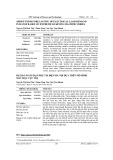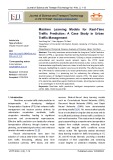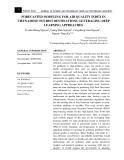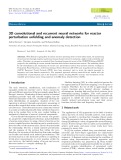
Recurrent Neural Network
-
Bài giảng Các kỹ thuật học sâu và ứng dụng - Bài 6: Recurrent Neural Network giới thiệu về mạng nơ-ron hồi quy (RNN), một kiến trúc mạnh mẽ cho dữ liệu trình tự. Chuyên đề này phân tích mô hình ngôn ngữ và các bài toán trong NLP, đồng thời đi sâu vào giới thiệu về RNN cùng những vấn đề và hướng giải quyết thường gặp. Đây là kiến thức cốt lõi để xử lý các chuỗi dữ liệu. Mời các bạn cùng tham khảo bài giảng để biết thêm chi tiết!
 37p
37p  hoatrongguong03
hoatrongguong03
 15-05-2025
15-05-2025
 0
0
 0
0
 Download
Download
-
Bài giảng Các kỹ thuật học sâu và ứng dụng - Bài 7: Các biến thể của Recurrent Neural Network tiếp tục khám phá các kiến trúc RNN tiên tiến hơn để giải quyết những hạn chế của mô hình cơ bản. Chuyên đề này trình bày Long Short Term Memory (LSTM), Gated Recurrent Unit (GRU), Bidirectional RNN và Deep-stacked RNN. Nắm vững các biến thể này giúp bạn xử lý hiệu quả các chuỗi dài và phức tạp. Mời các bạn cùng tham khảo bài giảng để biết thêm chi tiết!
 36p
36p  hoatrongguong03
hoatrongguong03
 15-05-2025
15-05-2025
 1
1
 0
0
 Download
Download
-
Đề cương cung cấp các kiến thức cơ bản trong lĩnh vực máy học đồng thời tiếp cận các hướng tiếp cận máy học hiện đại như thuật toán học sâu (Deep Learning) để ứng dụng giải quyết một số bài toán trong thực tế. Qua môn học này sinh viên có thể hiểu và cài đặt được kiến trúc mạng Convolutional Neural Network (CNN), Recurrent Neural Network (RNN) với các framework nổi tiếng như Tensorflow và Pytorch.
 9p
9p  bachlapkim01
bachlapkim01
 09-05-2025
09-05-2025
 3
3
 2
2
 Download
Download
-
Accurate forecasting of the electrical load is a critical element for grid operators to make well-informed decisions concerning electricity generation, transmission, and distribution. In this study, an Extreme Learning Machine (ELM) model was proposed and compared with four other machine learning models including Artificial Neural Networks (ANN), Convolutional Neural Networks (CNN), Long Short-Term Memory (LSTM) and Gated Recurrent Unit (GRU).
 10p
10p  viengfa
viengfa
 28-10-2024
28-10-2024
 3
3
 1
1
 Download
Download
-
This study introduces and evaluates the Long-term Traffic Prediction Network (LTPN), a specialized machine learning framework designed for realtime traffic prediction in urban environments.
 12p
12p  viengfa
viengfa
 28-10-2024
28-10-2024
 3
3
 2
2
 Download
Download
-
Bài giảng "Máy học nâng cao: Deep learning - An introduction" cung cấp cho người đọc các nội dung: Introduction, applications, convolutional neural networks vs. recurrent neural networks, hardware and software. Mời các bạn cùng tham khảo nội dung chi tiết.
 109p
109p  myhouse06
myhouse06
 24-03-2025
24-03-2025
 4
4
 1
1
 Download
Download
-
Severe air pollution in Vietnam's tourism areas has become a significant economic issue in recent years. While many studies have found a link between population exposure to air pollution and poor health outcomes, short-term exposure to air pollutants in high-pollution zones can result in acute health consequences; thus, poor air quality jeopardizes visitors' health and well-being and threatens the tourism industry's sustainability.
 14p
14p  viyamanaka
viyamanaka
 06-02-2025
06-02-2025
 3
3
 2
2
 Download
Download
-
Bài giảng "Máy học nâng cao: Deep learning an introduction" cung cấp cho người học các kiến thức: Introduction, applications, convolutional neural networks and recurrent neural networks, hardware and software. Mời các bạn cùng tham khảo nội dung chi tiết.
 109p
109p  abcxyz123_08
abcxyz123_08
 11-04-2020
11-04-2020
 57
57
 6
6
 Download
Download
-
Bài giảng Học sâu và ứng dụng - Bài 9: Mạng hồi quy. Bài này cung cấp cho học viên những nội dung về: bài toán dự đoán chuỗi; mạng hồi quy thông thường; lan truyền ngược theo thời gian (BPTT); mạng LSTM và GRU; một số áp dụng;... Mời các bạn cùng tham khảo chi tiết nội dung bài giảng!
 58p
58p  duonghoanglacnhi
duonghoanglacnhi
 07-11-2022
07-11-2022
 33
33
 6
6
 Download
Download
-
Luận văn Thạc sĩ Máy tính "Nghiên cứu bài toán bóc tách thông tin trong chứng minh thư sử dụng học sâu" trình bày các nội dung chính sau: Tổng quan về phát hiện, nhận dạng ký tự, sự phát triển của học máy và học sâu; Giới thiệu về mạng Convolution Neural Network; Mô hình mạng pixellink cho phát hiện văn bản; Giới thiệu về Convolution Recurrent Neural Network; Cài đặt thử nghiệm và kết quả.
 57p
57p  viabigailjohnson
viabigailjohnson
 10-06-2022
10-06-2022
 51
51
 7
7
 Download
Download
-
Tác giả mới dựa vào một số mô hình toán để dự báo như mô hình nhân, mô hình trung bình, mô hình ARIMA và SARIMA kết hợp để phân tích cũng như dự báo và ứnng dụng mô hình mạng LSTM là một phần đặc biệt của mạng RNN (Recurrent Neural Networks) để phân tích và dự báo bằng phương pháp học sâu. Mời các bạn cùng tham khảo.
 63p
63p  capheviahe27
capheviahe27
 23-02-2021
23-02-2021
 33
33
 6
6
 Download
Download
-
With Europe’s ageing fleet of nuclear reactors operating closer to their safety limits, the monitoring of such reactors through complex models has become of great interest to maintain a high level of availability and safety.
 9p
9p  christabelhuynh
christabelhuynh
 29-05-2020
29-05-2020
 13
13
 1
1
 Download
Download
-
Tài liệu tham khảo về thuật toán tính Derivation of Delta Rules
 6p
6p  haiph37
haiph37
 15-09-2010
15-09-2010
 118
118
 11
11
 Download
Download
-
Convergence of Online Learning Algorithms in Neural Networks An analysis of convergence of real-time algorithms for online learning in recurrent neural networks is presented. For convenience, the analysis is focused on the real-time recurrent learning (RTRL) algorithm for a recurrent perceptron. Using the assumption of contractivity of the activation function of a neuron and relaxing the rigid assumptions of the fixed optimal weights of the system, the analysis presented is general and is applicable to a wide range of existing algorithms....
 9p
9p  doroxon
doroxon
 12-08-2010
12-08-2010
 94
94
 9
9
 Download
Download
-
A Class of Normalised Algorithms for Online Training of Recurrent Neural Networks A normalised version of the real-time recurrent learning (RTRL) algorithm is introduced. This has been achieved via local linearisation of the RTRL around the current point in the state space of the network. Such an algorithm provides an adaptive learning rate normalised by the L2 norm of the gradient vector at the output neuron. The analysis is general and also covers simpler cases of feedforward networks and linear FIR filters...
 12p
12p  doroxon
doroxon
 12-08-2010
12-08-2010
 93
93
 16
16
 Download
Download
-
Data-Reusing Adaptive Learning Algorithms In this chapter, a class of data-reusing learning algorithms for recurrent neural networks is analysed. This is achieved starting from a case of feedforward neurons, through to the case of networks with feedback, trained with gradient descent learning algorithms. It is shown that the class of data-reusing algorithms outperforms the standard (a priori ) algorithms for nonlinear adaptive filtering in terms of the instantaneous prediction error.
 14p
14p  doroxon
doroxon
 12-08-2010
12-08-2010
 104
104
 10
10
 Download
Download
-
Stability Issues in RNN Architectures Perspective The focus of this chapter is on stability and convergence of relaxation realised through NARMA recurrent neural networks. Unlike other commonly used approaches, which mostly exploit Lyapunov stability theory, the main mathematical tool employed in this analysis is the contraction mapping theorem (CMT), together with the fixed point iteration (FPI) technique. This enables derivation of the asymptotic stability (AS) and global asymptotic stability (GAS) criteria for neural relaxive systems.
 19p
19p  doroxon
doroxon
 12-08-2010
12-08-2010
 112
112
 9
9
 Download
Download



























